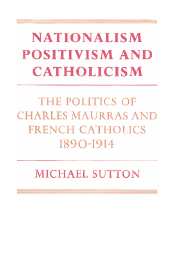 Nationalism, Positivism and Catholicism
Nationalism, Positivism and Catholicism Book contents
- Frontmatter
- Contents
- Dedication
- Acknowledgements
- Introduction
- 1 Maurras's appreciation of Comte
- 2 Individualism, the decline of France, and Maurras's proposed remedy
- 3 The time of the separation of Church and State
- 4 Blondel and Maurras
- 5 Laberthonnière's separation between politics and Christian faith
- 6 Orthodoxy and Rome
- Epilogue
- Notes
- Index
- Cambridge Studies in the History and Theory of Politics
3 - The time of the separation of Church and State
Published online by Cambridge University Press: 22 September 2009
- Frontmatter
- Contents
- Dedication
- Acknowledgements
- Introduction
- 1 Maurras's appreciation of Comte
- 2 Individualism, the decline of France, and Maurras's proposed remedy
- 3 The time of the separation of Church and State
- 4 Blondel and Maurras
- 5 Laberthonnière's separation between politics and Christian faith
- 6 Orthodoxy and Rome
- Epilogue
- Notes
- Index
- Cambridge Studies in the History and Theory of Politics
Summary
Sangnier's rhetorical dilemma
In the late 1890s, Georges Deherme was a leading figure in the co-operative movement and, having abandoned anarchism, he was becoming increasingly known for his Positivism. In 1898, he founded, under the name of the Coopération des Idées pour l'Enseignement Ethique-social du Peuple, the first and perhaps the best known of the working-class ‘people's universities’ that sprang up so abundantly in Paris at about the turn of the century. There was a ready supply of teachers from Desjardins's Union pour l'Action Morale, in whose activities Deherme himself played a conspicuous part. Thus he served on the editorial board of the Bulletin de l'Union pour l'action morale, as did two others of Positivist persuasions who were actively concerned with the betterment of labour conditions, namely Arthur Fontaine, destined to play a major rôle in the creation of the International Labour Organization in 1919, and Auguste Keufer, secretary-general of the great printing workers' union, the Fédération du Livre, from 1884 to 1920.
By 1904, however, Deherme's educational establishment faced an internal crisis, due to a conflict between Deherme and one of his lecturers who had rented, since the previous year, a villa in the Bois de Boulogne as a sort of maison du peuple for the workers enrolled at the Coopération des Idées and their families. Deherme's jaundiced view was that this pleasantly situated residence had become a centre for mere pleasure rather than for virtuous self-improvement.
- Type
- Chapter
- Information
- Nationalism, Positivism and CatholicismThe Politics of Charles Maurras and French Catholics 1890–1914, pp. 76 - 122Publisher: Cambridge University PressPrint publication year: 1982
